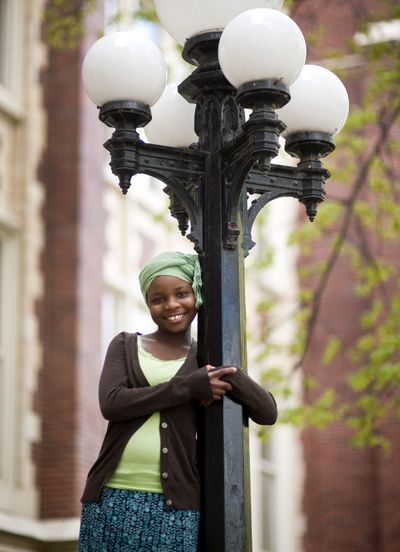Refugee to graduate: New culture part of LC senior’s education

She may be small in stature, but Ange Nemerimana’s high-wattage smile and colorful African garb make her difficult to miss in the halls of Lewis and Clark High School.
Born in the Democratic Republic of the Congo, Nemerimana spent her formative years in a refugee camp in Tanzania. LC adviser Marty Frazier said, “She was placed with her grandmother at birth because her mother didn’t feel like she could care for her.”
Nemerimana’s father had died, and when her mother remarried, Nemerimana stayed with her grandmother. When she was 2, war forced them to flee to a refugee camp. “When we first got there we lived in tents,” Nemerimana said.
Life in the camp was difficult. “If you needed clean water, you had to work for it,” she said. “We walked 45 minutes to get water and 45 minutes to bring it back. We had no oven. We cooked outside, so we needed to get wood. That was two to three hours away.”
The lifestyle made schooling problematic. Even so, Nemerimana said, “My grandma did everything for me to go to school. She paid for books, food – everything.”
However, it often wasn’t enough. “I skipped school because I was hungry. In Africa we don’t eat breakfast or lunch. We eat once a day before bed. If you have enough food to eat twice a day you are rich!”
In addition, sometimes she had to miss school because she didn’t have a notebook or a pencil, and sometimes she had to help her grandmother work on nearby farms.
Frazier said that despite the hardships, Nemerimana developed a passion for learning. “She taught herself to read in the refugee camp and fell in love with reading.”
At 13, she and her grandmother, along with several other refugees, came to Spokane through the World Relief organization. “None of us spoke any English,” recalled Nemerimana.
She still remembers waking up to breakfast in their host’s home. “There was chicken, beef, rice … so much on the table! I think, who is going to eat all this food? I tasted a pancake and thought it was really good, but my stomach wasn’t used to eating that much.”
When they settled into an apartment, it was up to Nemerimana to figure out bus schedules, grocery shopping and bill paying, and then to explain the processes to her grandmother.
“I used a Swahili-English dictionary, wrote my list and showed it to someone at the grocery store,” she said. “We stuck with foods we knew. Good thing you have labels on meat.”
However, school concerned her. “I didn’t want to go to high school because of my English.”
She needn’t have worried. Nemerimana excelled in her classes, especially math. “I love math,” she said. “Numbers make sense to me.”
Though she has flourished in America, she often misses her native land and her extended family. “I worry about my mom, stepdad and siblings,” she said. “I miss Africa – the trees I used to climb. I used to climb trees like crazy.”
Nemerimana, who turns 18 in June, plans to attend Eastern Washington University and study business and accounting. One day she’d like to own a business – a store specializing in African clothing.
Quick to smile and laugh, Nemerimana is also quick to credit the woman she believes is behind her success. “My grandma did everything to make sure I got my education. I am very proud to have her as my grandma.”